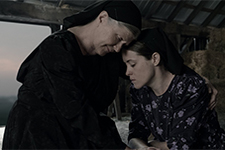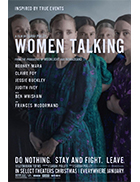Women Talking
|  An allegory based on an actual event, Sarah Polley’s Women Talking is a powerful indictment of patriarchy run amok, the logical end point of male power at the expense of women. Early in the film a title card tells us that “What follows is an act of female imagination,” which reflects both the content of the film as described in the title and the fact that the film is almost entirely female-driven: written and directed by a women, based on a novel by a woman, and acted by a largely female cast. The story takes place in 2010, although the rural, rustic, technology-free setting and the desaturated-to-the-point-of-near-sepia cinematography by Luc Montpellier suggests that it is taking place a hundred or two hundred years ago. If only it were so, and then we could rest assured that the sins committed were part of a distant past we’ve since grown out of. Not so, as the 2018 novel by Miriam Towes that Polley adapted was inspired by the events in a Menonite colony in Bolivia, in which a number of the colony’s men were convicted of drugging and raping the women. Towes, who grew up in a Menonite colony in Canada until she left at 18, takes that event as a launching point for a fictional imagining of what might have happened had the women in the colony, armed with this knowledge, been able to debate and decide what to do in the men’s absence. Explained away by several men being arrested and the rest of them travelling into the city to post bail, the women of the colony have 24 hours to decide what to do before they return: submit and forgive their attackers as they are commanded to do (lest they be denied entry into the Kingdom of Heaven), stay and fight for some kind of change, or simply leave. Each option is tortured, and the weight of the film rests on the debate that ensues among the women, each of whom has suffered the same desecration of their bodily autonomy, but whose aftermaths are distinctly different, albeit all tragic. A vote is taken by the women (who must sign X’s on a sheet, since all of them have been denied an education in how to read and write), with the majorities tied on whether to stay and fight or leave. Thus, the bulk of the film dramatizes the debate among chosen representatives of the main families who hash out the pros and cons of the two options inside a large barn, flanked by bales of hay and slats of light. The inherently restricted nature of the location gives the film a theatrical feel, although Polley ensures a strong sense of the cinematic through both an extremely wide aspect ratio of 2.76:1 and the use of haunting, poetic flashbacks and insert shots that illuminate the women’s discussions and arguments. The minutes are taken by August (Ben Wishsaw), the colony’s schoolteacher and the only adult male left behind. August is thoughtful and sensitive and sympathetic to the women’s plight, partially because he had left the colony at one point to attend university and returned, bringing with him knowledge and understanding from outside of its cloistered walls. His mother was previously excommunicated for questioning the colony’s power structure, so he has added incentive to support the women now. The opposing ends of the argument are represented by Scarface Janz (Frances McDormand), a stern, and uncompromising older woman who insists that they must forgive their attackers and move on because that is the only way to enter Heaven, and Salome (Claire Foy), whose physical attack of her rapist led to the police becoming involved and who refuses to forgive them. In the middle is Salome’s sister Ona (Rooney Mara), who is pregnant by her attacker and brings to light difficult questions such as what are they fighting for if they stay and fight? Dreams of collectivist governing with the men is written off by many of the women, particularly Mariche (Jessie Buckley), who is as brunt as she is pragmatic. And, while each of the women has a unique perspective, they all share in common the trauma of sexual assault that has left them bruised, impregnated, terrified, hurt. While Polley allows for a range of viewpoints, the essential reality of their physical abuse and subsequent gaslighting (it was ghosts or Satan or wild imagination, they are told) is never in question. Befitting the title, Women Talking is a film in which words truly matter—the distinction between “fleeing” and “leaving” becomes central to the debate, as does the nature of forgiveness (is forced forgiveness true forgiveness?). The narrator, who is speaking to a daughter some time in the future, notes how the women never talked about their bodies, so that when it came time to discuss what was happening to them, there was literally no language for it. And without language, there is a “gaping silence,” and within that silence is “the real horror.” And it is in that horror that the women live and debate and argue and, most importantly, decide their own fate. The title of the film is accurate—there is a lot of talking—but there is also yelling and whispering and laughing and crying and everything in between. Polley’s film is a great achievement in dramatizing both the power of words and the resilience of victims to throw off the shackles of their oppression and choose a different path. The film’s ending is both hopeful and ambiguous—not only for the women, but for the boys they are trying to raise to be better men than the ones who fathered them—suggesting faith in the future while also denying any simple assurances that all will be right in the world. Copyright © 2022 James Kendrick Thoughts? E-mail James Kendrick All images copyright © Orion Pictures |
Overall Rating: 


 (3.5)
(3.5)


